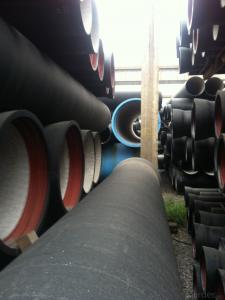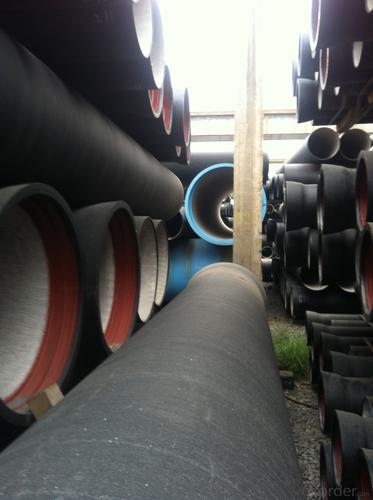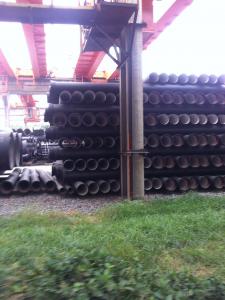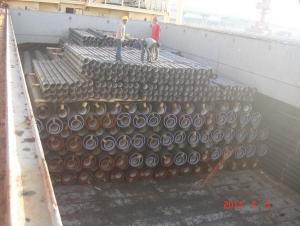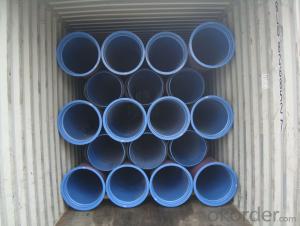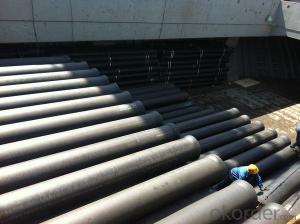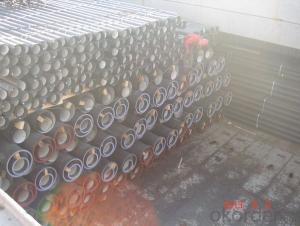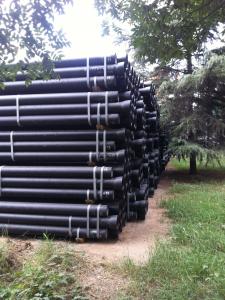DUCTILE IRON PIPES AND PIPE FITTINGS K8 CLASS DN1100
- Loading Port:
- Tianjin
- Payment Terms:
- TT OR LC
- Min Order Qty:
- 22 pc
- Supply Capability:
- 3000 pc/month
OKorder Service Pledge
OKorder Financial Service
You Might Also Like
Material : Ductile Cast Iron
Size Range : DN 80mm to DN 2000mm
Unit Effective Length : 6m or 5.7m
Manufacture Standard: ISO 2531:1998/ EN 545:2006/EN 598:2007
Annual capacity : 200,000 tons
Coating Exterior: Zinc 130g/m2 according to ISO 8179-1 and bitumen coating 70 microns.
Cement Interior: Portland Cement/ High Alumina Cement/ Sulphate Resisting Cement Lining according to ISO 4179
Special requirements on external coating and internal lining can be applied
We also provide accessories such as SBR/EPDM rubber gaskets, lubricant paste, pipe caps, PE sleeves, etc.
Additional Parts:
Each pipe is strictly inspected according to related standard to ensure permanently high performance.
Easy Installation at site and service free for life
Long Service Lifespan
Quotation will arrive you within 24hours once we get your inquiry.
We guarantee offering you a competitive price.
A copy of original inspection reports of pipes will be offered after shipment.
Photos of loading process will be sent to the customer after shipment effect.
We will follow-up the delivery progress after shipment effect and update to the customer on weekly basis.
- Q: Can ductile iron pipes be used for bridge piers?
- Yes, ductile iron pipes can be used for bridge piers. Ductile iron pipes are known for their high strength and durability, making them suitable for various applications, including bridge construction. They have excellent resistance to corrosion and can withstand heavy loads, making them a reliable choice for supporting bridge piers. Additionally, ductile iron pipes offer ease of installation and maintenance, which can be advantageous in bridge construction projects. However, it is important to consider the specific requirements and design specifications of the bridge before selecting ductile iron pipes as the material for bridge piers. Proper engineering evaluation and consideration of factors such as load capacity, soil conditions, and environmental factors are essential to ensure the suitability and safety of using ductile iron pipes for bridge piers.
- Q: Can ductile iron pipe be used for hot water applications?
- Yes, ductile iron pipe can be used for hot water applications. Ductile iron pipe is known for its strength, durability, and high resistance to corrosion, which makes it suitable for a wide range of applications, including hot water systems. It can handle high temperatures and pressure, making it a reliable choice for transporting hot water. Additionally, ductile iron pipe's thermal conductivity properties allow for efficient heat transfer, ensuring that hot water is delivered effectively throughout the system. Therefore, when considering materials for hot water applications, ductile iron pipe is a suitable option.
- Q: What are the advantages of using ductile iron pipes?
- There are several advantages of using ductile iron pipes. Firstly, they have high tensile strength and durability, making them resistant to cracking and breaking under pressure or external forces. Secondly, ductile iron pipes have excellent corrosion resistance, allowing them to withstand harsh environments and reducing the risk of leaks and pipe failures. Additionally, they provide better flow characteristics due to their smooth internal surface, ensuring efficient transportation of fluids. Lastly, ductile iron pipes have a long lifespan and require minimal maintenance, resulting in cost savings and reliable infrastructure for water supply and wastewater management systems.
- Q: What is the expected hydraulic efficiency of ductile iron pipes?
- The expected hydraulic efficiency of ductile iron pipes is generally high, as they have a smooth interior surface that minimizes friction and allows for efficient flow of water or other fluids.
- Q: What are the different sizes of ductile iron pipes available?
- Ductile iron pipes come in a range of sizes to meet different needs and purposes. Typically, the diameter of these pipes varies from 3 inches to 64 inches. This variety in sizes offers versatility and adaptability in various sectors such as water supply, sewage systems, irrigation, and industrial piping. Smaller ductile iron pipes, with diameters ranging from 3 to 12 inches, are commonly used for residential and small-scale purposes like household plumbing, fire hydrant systems, and small irrigation projects. These sizes are commonly found in urban areas and residential neighborhoods. For larger-scale applications, larger ductile iron pipes are employed. These pipes can have diameters ranging from 14 to 64 inches. They are primarily used in municipal water supply systems, wastewater treatment plants, and industrial facilities where there is a need for high-volume water flow. The wide array of sizes available in ductile iron pipes ensures that they can accommodate different flow rates and pressure requirements. This allows engineers, contractors, and designers to choose the appropriate size based on the specific demands of a particular project or application. To ensure the proper selection of ductile iron pipe size for a specific project, it is essential to consult industry standards, local regulations, and engineering guidelines. This ensures that the pipes meet the required performance standards and are suitable for the intended use.
- Q: What are the different joint types available for ductile iron pipes?
- Ductile iron pipes offer various joint types that are essential for maintaining the integrity and reliability of the pipeline system. 1. The push-on joint is the most prevalent joint used for ductile iron pipes. It involves inserting a rubber gasket into the bell end of the pipe and then pushing the spigot end into the bell, ensuring a tight seal. This joint is easy to assemble, quick, and has excellent resistance against soil movement and water pressure. 2. The mechanical joint involves a gland and follower that are secured around the spigot end of the pipe using bolts and nuts. It provides a robust and durable connection and is commonly used for larger diameter pipes or applications that expect higher pressure or thrust loads. 3. Flanged joints are utilized when connecting pipes to other components like valves or fittings. The pipe ends are machined and equipped with flanges that are bolted together using gaskets, ensuring a secure connection. These joints find frequent use in industrial applications or situations requiring frequent disassembly. 4. Restrained joints are designed to withstand significant external forces and prevent separation or pulling apart of the pipe. They typically combine mechanical joint components, such as bolts and glands, with additional restraining elements like welded or bolted-on restraints. These joints are commonly employed in high-pressure applications or situations where substantial external forces are present. Choosing the appropriate joint type is crucial and depends on factors such as pipeline design, operating conditions, and installation requirements. Seeking guidance from experienced engineers or pipe manufacturers can aid in determining the most suitable joint type for a specific ductile iron pipe application.
- Q: Can ductile iron pipes be used for underground sewage systems?
- Yes, ductile iron pipes can be used for underground sewage systems. Ductile iron is a type of cast iron that has enhanced flexibility and strength, making it suitable for various applications, including sewage systems. Ductile iron pipes offer several advantages for underground sewage systems. Firstly, they have excellent corrosion resistance, which is crucial in sewage systems where the presence of moisture and chemicals can cause corrosion over time. This resistance to corrosion ensures the long-term durability and reliability of the pipes. Secondly, ductile iron pipes have high tensile strength, allowing them to withstand the pressure and stress that can occur in underground sewage systems. They are resistant to ground movements, such as soil settling or shifting, which can cause damage to other types of pipes. Furthermore, ductile iron pipes have a smooth internal surface, which results in a better flow capacity and reduces the likelihood of clogging or blockages in the sewage system. This smooth surface also helps to minimize the accumulation of debris and sediment, reducing the need for frequent maintenance and cleaning. Another important factor is that ductile iron pipes are available in various sizes and can easily be connected using a range of joint systems, allowing for flexibility in designing and constructing underground sewage systems. In summary, ductile iron pipes are an excellent choice for underground sewage systems due to their corrosion resistance, high tensile strength, smooth internal surface, and ease of installation.
- Q: What is the expected joint deflection of ductile iron pipes?
- The expected joint deflection of ductile iron pipes depends on various factors such as the diameter, wall thickness, and type of joint used. However, in general, ductile iron pipes are designed to have a joint deflection capability of up to 5 degrees for restrained joints and up to 10 degrees for flexible joints.
- Q: What are the advantages of using ductile iron pipes over other materials?
- There are several advantages of using ductile iron pipes over other materials. Firstly, ductile iron pipes have a high tensile strength, which makes them more resistant to pressure and external forces, reducing the risk of cracks or leaks. Secondly, ductile iron pipes have a longer lifespan compared to other materials, as they are highly durable and resistant to corrosion. Additionally, ductile iron pipes have a smooth internal surface, promoting efficient water flow and minimizing the risk of blockages. Lastly, ductile iron pipes are relatively cost-effective and easy to install, making them a preferred choice for various applications in water distribution, sewer systems, and industrial settings.
- Q: Are ductile iron pipes suitable for use in brewery facilities?
- Yes, ductile iron pipes are suitable for use in brewery facilities. Ductile iron pipes are durable, corrosion-resistant, and can withstand high-pressure applications, making them ideal for transporting water, steam, and other fluids within brewery facilities. Additionally, the smooth interior surface of ductile iron pipes minimizes friction and prevents the build-up of sediments or organic materials, ensuring the purity and quality of the beer being produced.
Send your message to us
DUCTILE IRON PIPES AND PIPE FITTINGS K8 CLASS DN1100
- Loading Port:
- Tianjin
- Payment Terms:
- TT OR LC
- Min Order Qty:
- 22 pc
- Supply Capability:
- 3000 pc/month
OKorder Service Pledge
OKorder Financial Service
Similar products
Hot products
Hot Searches
Related keywords
